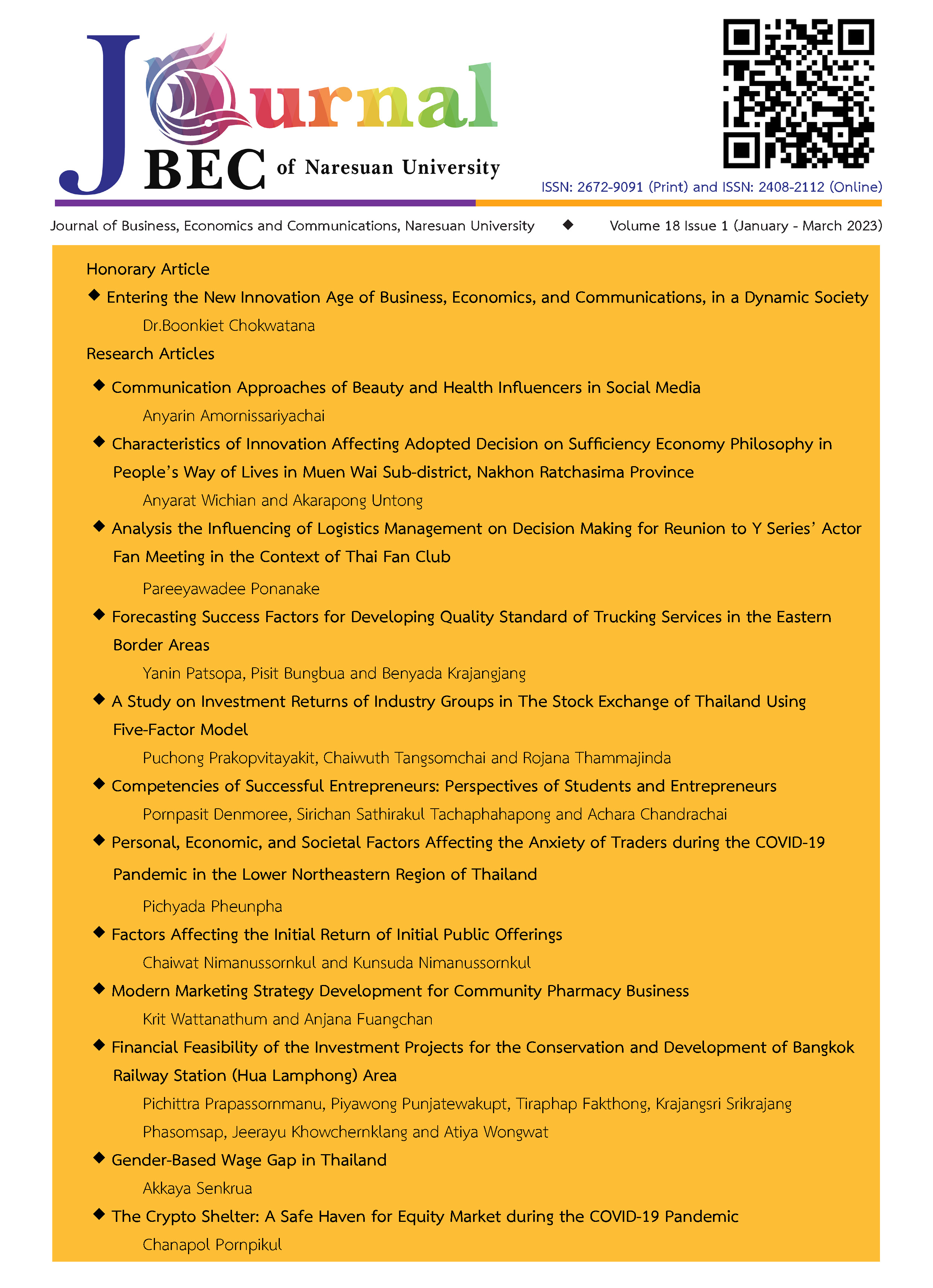Competencies of Successful Entrepreneurs: Perspectives of Students and Entrepreneurs
Main Article Content
บทคัดย่อ
The objectives of this research were 1) To study the entrepreneurial competencies of entrepreneurs in manufacturing, trading and service businesses 2) to study the competencies of students and 3) to compare the competency between entrepreneurs and students by opinion level. The sample groups used for the research were 1) 390 undergraduate students, quota sampled by university categories; and, 2) 20 purposively sampled entrepreneurs. The tools used in this survey research were interviews and questionnaires. Data were analyzed by descriptive statistics using percentage, mean and standard deviation, and t-test. The research conclusions are as follows. 1) Entrepreneurs have a high level of opinion on entrepreneurial competencies (x̄ = 3.92). 2) Students have a medium level opinion on entrepreneurial competencies (x̄ = 3.39). 3) In comparing entrepreneurs and students in terms of their entrepreneurial competencies, there is a significance level of 0.05 in all three aspects, the average entrepreneurs’ opinion level being higher than that of students.
Article Details

อนุญาตภายใต้เงื่อนไข Creative Commons Attribution-NonCommercial-NoDerivatives 4.0 International License.
เอกสารอ้างอิง
Bunnapa, C. (2016). Entrepreneurial features and business opportunities affecting entrepreneurial success in construction material businesses in Bangkok. Master thesis, M.B.A.,Bangkok University, Bangkok.
Chantarasupasen, J. (2014). The Desired characteristics of tourism entrepreneurs. Journal of Bangkokthonburi University, 3(2), 25-31.
Chokpromanan, W. and Jadesadalug, V. (2015). Characteristics of entrepreneurs in the business success of shop operators in Don Wai Floating Market, Nakhon Pathom Province.
Veridian E-Journal, Silpakorn University, 8(2), 967-988.
European Commission. (2012). Effects and impact of entrepreneurship programmes in higher education. Entrepreneurship Unit Directorate-General for Enterprise and Industry European Commission B-1049 Brussels.
European Union. (2016). EntreComp: The Entrepreneurship Competencies Framework. Luxembourg: Publication Office of the European Union.
Gál, P., Holienková, J. and Holienka, M.(2015). Entrepreneurial characteristics of students in different fields of study: a view from entrepreneurship education perspective. International Science Exploration Event 2019 Seminar, 7-8 November, 2019 (pp. 7-12). Rzeszow, Poland. (2015, pp. 7-12)
Jantar, J. (2019). The key characteristics of private apartment entrepreneurs in Chang Phuak Sub-District, Mueang District, Chiang Mai Province. Master thesis, M.B.A.,Chiangmai Rajabhat University, Chiangmai.
Kettian, W. (2013). Effect of entrepreneurial characteristics on the business success of the medium enterprises. Master thesis, M.B.A.,Rajamangala University of Technology Isan, Nakhon Ratchasima.
Kiatepornphichet, M. and Parncharoean, J. (2019). Undergraduate student's attribute and entrepreneurial intent. Dhurakij Pundit Communication Arts Journal, 7(2), 5.
Kharawaisi, F., Pooncharoen N. and Jamornmarn, W. (2011). The study of successful characteristics of hotel business entrepreneurs in the lower northern provinces of Thailand. Journal of Business, Economics and Communications, 7(1), 9.
Korsukthaweekhoon, C. (2018). The studying of entrepreneurial motivation and intention of higher education students in Thailand. Master Thesis of Entrepreneurship and Management, Bangkok University.
Lackeus, M. (2013). Developing entrepreneurial competencies: an action-based approach and classification in entrepreneurial education. Master Thesis of Chalmers, University of Technology Gothenburg, Sweden.
Mustapha, M. and Selvaraju, M. (2015). Personal attributes, family influences, entrepreneurship education and entrepreneurship inclination among university students. Journal of Kajian Malaysia, 33(1), 2015, 155–172.
Office of the Civil Service Commission (2010). Manual of Competency Determination in Civil Service : Core Competency Handbook. Bureau of Development of Positioning and Compensation Systems. Nonthaburi. From https://www.ocsc.go.th
Phan, A. and Nguyen, M. (2014). Entrepreneurial traits and motivations of the youth – an empirical study in Ho Chi Minh City. Vietnam International Journal of Business and Social Science, 5(1), 5-9.
Phungphol ,W. and Jadesadalug, V. (2018). New entrepreneurial characteristics affecting business performance through the competitive advantage of the start-up business. Dusit Thani College Journal, 12(2), 2.
Sornsermsombut, P. (2018) Influence of characteristics on entrepreneurial intention of Chiangmai Rajabhat University. Journal of Management Science Chiangrai Rajabhat University, 15(2), 117-138.
The Quality Assurance Agency for Higher Education. (2012). Enterprise and Entrepreneurship Education: Guidance for UK Higher Education Providers. from www.qaa.ac.uk.
The Quality Assurance Agency for Higher Education. (2018). Enterprise and Entrepreneurship Education: Guidance for UK Higher Education Providers. from www.qaa.ac.uk.
Tungsongcharoen, S. (2015). Entrepreneurial orientation of MBA student in Bangkok. Master of Business Administration, Thammasart University.
Wiset, N. (2000). Entrepreneurial characteristics and intentions to become an entrepreneur of students majoring in entrepreneurship in Bangkok Area. Report Ratchphruek College (pp.33-37).
Wuttikaro, A. (2000). Higher education and the creation of graduates as entrepreneurs. Chulalongkorn Journal, 12(46), 39-48.


